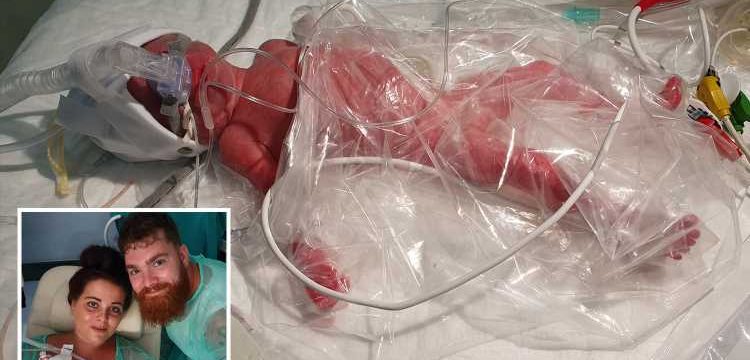A MUM is stuck in Spain after going into labour and giving birth to her first child just two weeks after the abortion cut off date.
Shannon Holbrook, 25, and boyfriend Matthew Beach, 27, from Birmingham, travelled to the country with Matthew’s family for a break in the sun at the beginning of July.
However, just six days after arriving, Shannon, who was 26 weeks pregnant, was suddenly overwhelmed by an excruciating pain – giving birth to 2lb Scarlett-Rose just 15 minutes later.
The family said they were overwhelmed to hear the first cry, however Scarlett later took a turn and needed to be placed on a machine to help her breathe.
Speaking to the Sun Online, Mr Beach said: “I was just in pure shock. Shannon and I had joked before going to Spain about the baby being born there – and then she actually was.
“Her waters broke and 15 minutes later my sister told me to check, and Scarlett just came straight out into my hands.
“The ambulance arrived 25 minutes later as we were staying up in the mountains. They said Scarlett had to go straight to hospital.”
STUCK IN SPAIN
A short while after arriving in the first hospital, Scarlett was transferred to a second in Alicante – where she could receive better care.
It was then that Matthew began to ask questions, the first two being would Scarlett be OK, and how long until she could travel home to the UK.
Mr Beach added: “It’s hard enough having a premature baby, let alone having one in a country where you cannot speak the language.
“It is hard. We have found out Scarlett will not be allowed home until she’s at least 35 weeks, so that’s the middle of October. After that we’re allowed to start looking into bringing her back to the UK.
“Luckily we had travel insurance so our medical bills are covered and we have a place to stay, however it’s an hour away.”
Shannon’s twin sister later started a Go Fund Me with the aim of raising up to £1,000 for the couple, to cover their travel costs to see Scarlett, food, and water.
On the page, she said: “As some of you are now aware, my twin sister gave birth unexpectedly while on holiday in Spain to beautiful Scarlett-Rose Beach, who decided to make an arrival 13 weeks early.
“Scarlett has to stay in hospital in Spain until she is at least 35 weeks gone, so about October, maybe later depending on when she’s well enough to come home.
“She is currently on a ventilator as she is unable to breathe on her own, and only weighing 2lbs 5oz.
“We would appreciate any little amount anyone could give. We will use the funds to help Shannon and Matt while they're stuck over in Spain, anything Scarlett may need and to help with day to day living as this has come as a shock to everyone.”
Mr Beach added: “We hate having to ask people for money, but right now we just need enough to get by.
“We’re staying in Spain to be with Scarlett. A few days ago she took a bad turn and needed help to breathing. But she has since recovered and has even put on weight, which is great.
“We just can’t believe that she’s here. We were scared to death at first but she’s doing well now!"
Is it safe for pregnant women to fly?
Most experts agree that so long as it is a low-risk, normal pregnancy, it is safe for expectant mums to fly.
They say there is no evidence that increased radiation and changes in air pressure can cause miscarriage, early labour or the waters to break.
However, if a woman has been suffering problems during her pregnancy, experts say it might be better to avoid travelling by plane.
They say you should always consult your GP or midwife before leaving for your trip.
All airlines have their own policy when it comes to accepting pregnant passengers for travel.
However, most experts say that pregnant women should not fly after 36 weeks or 32 weeks if they are expecting twins.
After 28 weeks, most airlines require pregnant passengers to get a letter from your GP or midwife confirming your due date and that you are fit to fly.
In addition, many pregnant women chose not to fly in the first 12 weeks of pregnancy, when there is a higher risk of miscarriage and are likely to be suffering sickness and exhaustion.
Source: Read Full Article









